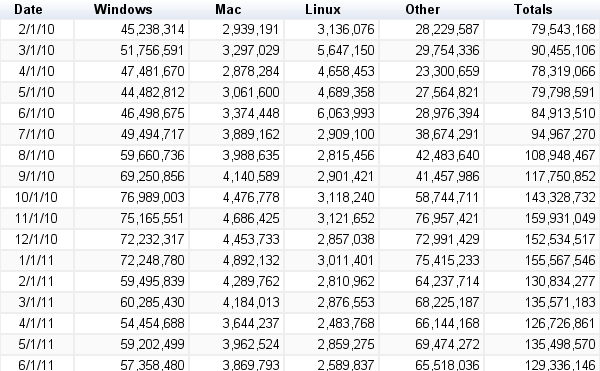In the not-too-distant past, Macs were a relative rarity in the laptop bags of those attending open source conferences.
Not so anymore.
I recently had the chance to go through some download data from SourceForge for an article on the site’s blog and talk to Community Hacker Rich Bowen about what the data meant. Windows downloads led the pack by far, and Mac and Linux download levels swapped positions over the past couple of years.
Bowen told me out he saw people whipping out MacBooks at ApacheCon and other places he never would have seen them a few years back, anecdotally supporting the overall trend seen in the data.
The “other” category, however, grew by leaps and bounds in that same time period, starting at a level well below Windows downloads and finishing significantly above.
In the time allotted to research and post the article, we were unable to determine what was driving the “other” category, except the belief that mobile downloads were contributing to that.
While the mobile downloads are at least partially responsible for the changes, soon after my initial post, Bowen got to the bottom of things: Automatic updates.
Just as we expect automatic updates on the software we pay for, we’ve come to expect automatic updates on our free and open source software. Much of the “other” category was due to non-browser downloads.
The lack of information about that category caused some spirited discussion in the comments on the original post, with some readers calling the entire article flawed due to the size of the “other” category. Others didn’t like that I separated out the different download platforms into individual charts.
I’d done that because the disparity in numbers was so large that I didn’t want the overall trends on each platform to be nearly invisible. Then reader Brad Landers came to the rescue and used the Google Visualization API and put together some nice charts that showed the trends, but kept all the data on one chart (note to self: Use the API next time around). This was my personal favorite of the charts he pulled together:

I disagree, however, that any slice of data rendered the overall point of the article pointless (OK, not shocking, considering I wrote it).
In fact, now knowing that those are automatic updates, it doesn’t really change things, as those are people who previously downloaded the software and are just updating. Previously, those updates would have been mixed in with the overall download data and could have affected the trends.
With that variable somewhat out of the way, rest of the data is a bit cleaner, in a sense, showing the trend toward Mac owners using open source more than ever (or, alternatively, open source advocates using Macs more than ever) more clearly. After all, the non-browser downloads reflect the operating systems of people who downloaded the software originally months or even years ago.
The main issue was that the OS wars are kind of over. The platform you work on matters little – it’s what you do with it that does. Some of the most popular projects on SourceForge are Mac-only or are the Mac-specific versions, including Burn, Gimp on OSX and RAR Expander.
And, sure, those who use Linux distros are more likely than ever to go straight to the source to download software, rather than OSS hosting facilities such as SourceForge or GitHub. So the “decline” in Linux downloads at SourceForge doesn’t mean quite as much
The real winner is the end user, who can avail him- or herself of just about any project on the platform of his or her choice.




